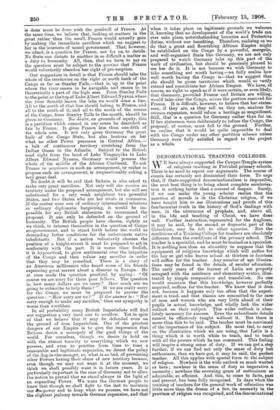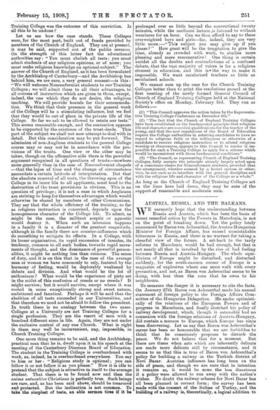DENOMINATIONAL TRAINING COLLEGES.
WE have always supported the Cowper-Temple system of religious teaching in Provided primary schools. There is no need to repeat our arguments. The course of events has certainly not diminished their force. To urge that, if State-supported denominationalism is impossible, the next best thing is to bring about complete secularisa- tion is nothing better than a counsel of despair. Surely, if we can make the young scholar realise that the sanction of morals is in the Christian religion, if we have taught him to see illustrations and proofs of this fundamental truth in the history of God's dealings with men, in the utterances of prophets, and, above all, in the life and teaching of Christ, we have done well. .Further instruction, represented for the Anglican, it may be said, by the second or dogmatic part of the Catechism, may be left to other agencies. But the conditions of a Training College for teachers are absolutely different from the conditions of the primary school. The teacher is a specialist, and he must be trained as a specialist. It is nothing less than an absurdity to suppose that the equipment of religious knowledge which will suffice for the boy or girl who leaves school at thirteen or fourteen will suffice for the teacher. Any number of apt illustra- tions may be found in the details of secular education. The early years of the learner of Latin are properly occupied with the accidence and elementary syntax, illus- trated by simple composition and translation. No one would maintain that this knowledge, however perfectly acquired, suffices for the teacher. We know that it does not, because it happens only too often that the experi- ment is tried, and that classes are committed to the care of men and women who are very little ahead of their pupils in actual knowledge, and wholly lack the wider outlook on their subject. This wider outlook is abso- lutely necessary for success. Even the subordinate details cannot be effectively taught without it. But there is more than this to be said. The teacher must he convinced of the importance of his subject. He must feel, to carry on the illustration which we are using, that Latin is a thing which it is worth while to teach, and to teach with all the powers which he can command. This feeling will inspire a strong sense of duty. If we can get a step further, if we can find not only the sense of duty but enthusiasm, then we have got, it may be said, the perfect teacher. All this applies with special force to the subject of religion. Nowhere is the wide outlook so much wanted as here ; nowhere is the sense of duty so imperative a necessity ; nowhere the crowning grace of enthusiasm so admirable, so efficient. And. this, to come to facts, past and present, has been fully recognised. In days when the training of teachers for the general work of education was little more than the dream of a few, its necessity in the province of religion was recognised, and the denominational Training College was the outcome of this conviction. Is all this to be undone ?
Let us see how the case stands. These Colleges were, for the most part, built out of funds provided by Members of the Church of England. They are at present, it may be said, supported out of the public revenue. On the strength of this latter fact the educational authorities say "You must abolish all tests ; you must admit students of any religious opinions, or of none; you must make religious knowledge an optional subject." The answer of the Church of England, as it has been formulated by the Archbishop of Canterbury—and the Archbishop has behind him, we are sure, a very general consent—is this : "We will welcome Nonconformist students to our Training Colleges ; we will admit them to all their advantages, to all courses of instruction which are given in them, except, indeed, the one which they do not desire, the religious teaching. We will provide hostels for their accommoda- tion. We think that their presence in the general work of the College will be a stimulating influence, but we feel that they would be out of place in the private life of the College. So far we ask to be allowed to retain our tests." This seems reasonable enough, and the contention appears to be supported by the existence of the trust-deeds. This part of the subject we shall not now attempt to deal with in detail. But this consideration may be put forward. The admission of non-Anglican students to the general College course may or may not be in accordance with the pro- visions of the trusts. One view or the other may be taken, though on the affirmative side there is the powerful argument recognised. in all questions of trusts—nowhere more generally than in the case of Nonconformist chapels —that the lapse of time and the change of circumstance necessitate a certain latitude of interpretation. But that the absolute removal of all tests, the throwing open of the College in its inner life to all applicants, must tend to the destruction of the trust provisions is obvious. This is no question of privilege ; it is not a case in which Anglicans are striving to keep for themselves advantages which would otherwise be shared by members of other Communions. They say that the whole efficiency of the training, so far as religious instruction is concerned, depends upon the homogeneous character of the College life. To admit, as might be the case, the militant sceptic or agnostic would destroy it. When such an intrusion happens in a family it is a disaster of the greatest magnitude, although in the family there are counter-influences which do something to mitigate its effects. In a College, with its looser organisation, its rapid succession of inmates, its tendency, common to all such bodies, towards rapid move- ments of thought, and the dominance of powerful person- alities, it might be nothing less than ruinous. The sense of duty, and it is on this that in the case of the average man or woman we have commonly to rely, fostered by the harmony of feeling, would be deplorably weakened by debate and division. And what would be the lot of enthusiasm ? What would be the experience of piety set in the midst of this confusion of creeds or no creeds ? It might survive ; but it would survive, except where it was rooted in some exceptionally strong and sweet nature, embittered and fanatical. Perhaps it will be said that the abolition of all tests succeeded in our Universities, and that therefore we need not be afraid to follow the precedent. In truth there is no analogy between the two cases. Colleges at a University are not Training Colleges for a single profession. They are the resort of men with a hundred different aims in life. Again, they are not under the exclusive control of any one Church. What is right in them may well be inconvenient, nay, impossible, in Church Training Colleges.
One more thing remains to be said, and the Archbishop, practical man that he is, dwelt upon it in his speech at the meeting of the Canterbury Diocesan Board of Education. The student in the Training College is overburdened with work, as, indeed, he is overburdened everywhere. You say to him or her : "Religious study is optional ; you can follow it or not follow it as you please." Now it is idle to pretend that the subject is attractive in itself to the average student. That there is to be found now and then the anima naturaliter Christiana is perfectly true. Such beings are rare, and, as has been said above, should be treasured and protected. But the inclination is not common. To take the simplest of tests, an able sermon tires if it be prolonged ever so little beyond the conventional twenty minutes, while the mediocre lecture .is listened to without weariness for an hour. Can we then afford to say to these overweighted boys and girls—for, indeed, they are very little more :—" this subject you may give up if you please ? " How great will be the temptation to give the time, already so crowded with work, to studies more pleasing and more remunerative! One thing is certain amidst all the doubts and contradictions of a confused debate, that the vast majority of voices is for a religious element in education, and this is • the way to make it impossible. We want secularised teachers as little as secularised schools.
We cannot sum up the case for the Church Training Colleges better than to print the resolutions passed at the first meeting of the newly formed General Council of Church of England Training Colleges held at the National Society's office on Monday, February 3rd. They run as follows :— (1) "This Council approves the action taken by the Representa- tive Training College Conference on December 6th."
(2) "The fact that the Church of England Training Colleges have been established on the fundamental principle that religious life and character are essential qualifications for the teacher of the young, and that the new regulations of the Board of Education require the College authorities in selecting candidates to have no regard to religious faith or the willingness or otherwise of a candidate to receive religious instruction or to attend religious worship or observances, appears to this Council to render it im- possible for such a Training College to apply for a scheme which would be inconsistent with those fundamental conditions."
(3) "The Council, as representing Church of England Training Colleges, fully accepts the principle already largely acted upon of a conscience clause for Nonconformist students, provided that the arrangement, whether secured by a hostel system or other.. wise, be not such as to interfere with the general discipline and with the religious life and character of the College as a whole."
As long as the Church of England Training Colleges act on the lines here laid down, they may be sure of the support of reasonable and moderate men.





































 Previous page
Previous page